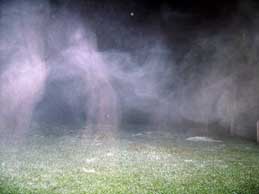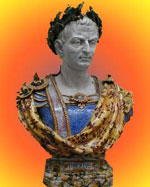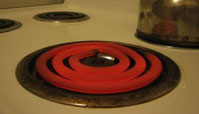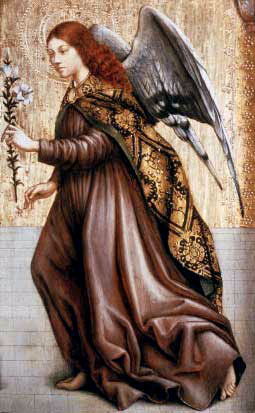
Haunting Habits
by Deborah Beach Giordano
Hauntings
Herod was mistaken; it wasn’t John the Baptist returned from the dead, but a live-and-kicking Jesus of Nazareth who was afoot in Galilee. Yet to some extent the guilty king was right: our sins can return to haunt us. The things we have done, and those we have left undone raise their heads and trouble our thoughts long after they are past.
 For a time the memory may fade, yet on a cold and lonely night or a quiet sunlit morning the whole experience can suddenly reappear with a terrifying vividness. It arises, as if from the dead, more powerful than before.
For a time the memory may fade, yet on a cold and lonely night or a quiet sunlit morning the whole experience can suddenly reappear with a terrifying vividness. It arises, as if from the dead, more powerful than before.
We can divorce, remarry, relocate, change our career, car, or hair color, enter the witness protection program — yet whatever we do, wherever we go, we cannot hide from our conscience. There is no escaping what our hearts know to be true.
Missed Opportunities
Does that mean, then, that our situation is hopeless? Are we doomed to be stalked by the specters of our many sins and shortcomings?
If we use Herod as our case study, that would seem to be true. But Herod was — to put it mildly — a real stinker. Fiercely proud, stubborn, and violent; desperate to retain his control over the people, fearful of falling out of favor with Rome; his life was a constant struggle to keep his foothold on the slippery slope of worldly power. Nothing else mattered.
 And yet I find myself feeling sorry for Herod — despite his many less-than-admirable deeds. I think that’s because he had so many “near misses” with redemption: numerous conversations with the Baptizer, the arrival of Jesus in his kingdom, and even a cry from within his own spirit: “the man I beheaded has returned to haunt me!”
And yet I find myself feeling sorry for Herod — despite his many less-than-admirable deeds. I think that’s because he had so many “near misses” with redemption: numerous conversations with the Baptizer, the arrival of Jesus in his kingdom, and even a cry from within his own spirit: “the man I beheaded has returned to haunt me!”
He was close, so close to redemption and a new beginning; a life of joy and freedom was right there, within his reach. But despite the many opportunities he was given, Herod repeatedly chose to follow the Roman roads instead of the blessing Way. He didn’t place his trust in God’s goodness, but relied on the kindness of Caesar. (And you remember how that turned out!)
He remained caught in a trap of his own devising.
Who, Me?
Of course Herod found it easier to keep doing the same things he’d always done, in the same way he’d always done them. Habits are hard to break, whether you are a Near Eastern king or a midwestern schoolteacher.
 And no habit is more entrenched than our refusal to admit wrongdoing. At the first sign of trouble we proclaim our innocence: “Don’t look at me.” “I didn’t do it.” Whatever it is, it is never our fault, but someone else’s responsibility. Other people, unusual circumstances, mechanical malfunctions, freak weather patterns, the phases of the moon .... when things go wrong we immediately assign the blame elsewhere. It’s nothing to do with us.
And no habit is more entrenched than our refusal to admit wrongdoing. At the first sign of trouble we proclaim our innocence: “Don’t look at me.” “I didn’t do it.” Whatever it is, it is never our fault, but someone else’s responsibility. Other people, unusual circumstances, mechanical malfunctions, freak weather patterns, the phases of the moon .... when things go wrong we immediately assign the blame elsewhere. It’s nothing to do with us.
But we do make mistakes; we do fail, we do foul up; we do harmful and hurtful things — often accidentally, occasionally intentionally. There is no denying it: we have all done things we ought not to have done, and have left undone things we should have done. Pretending to be flawless is laughable; we’re human beings, for Pete’s sake!

Free Will and Hard Work
We are imperfect. But we are not irreparably, irredeemably flawed. We are Works in Progress — if we’re willing to do the work. It is up to us; we can choose to follow the Path of holy living, or remain caught up in soul-eroding ways.
And it isn’t easy. Habits are hard to break; long built-up defenses are difficult to overcome; regret, guilt, and shame can seem nearly unbearable to face.
It isn’t easy, but it can be done: it’s what we’re called to do.
Following Christ is a lifelong journey: it is an ongoing process, not a fait accompli performed at our baptism. With God’s help and our “yes,” we continually grow into the likeness of our Lord throughout our lives.
The Good in Bad
Even the “bad stuff” we’ve done can be redeemed — in fact it has to be. In order for us to develop our faith: deepen our compassion, expand our understanding, extend our forgiveness — we have to experience what it is like to need those gifts. For us to truly appreciate God’s mercy and the miracle of new beginnings, we must know what it is like to stand in need of kindness, forgiveness, and understanding. In order to give, we must have received.
If we’ve never come to terms with our own sins and shortcomings, we’re very liable to turn into sanctimonious, self-righteous (wrong-headed) twits: sneering at the vulnerable, the weak and the weary. Jesus never sneered.
And if we do not admit our wrong turnings, there’s every chance we’ll repeat them.
Redemption is rescue from errors, not their erasure. All that we have done, the good and the bad, make us who we are; they serve their purpose.
 Flaws and failings that are redeemed (not forgotten) are transformed into wisdom: remembering that when you touched the hot stove you burned your fingers will help you resist touching the hot stove again. Recalling the grief you experienced or caused by sharp words or impulsive actions will help you to resist repeating them.
Flaws and failings that are redeemed (not forgotten) are transformed into wisdom: remembering that when you touched the hot stove you burned your fingers will help you resist touching the hot stove again. Recalling the grief you experienced or caused by sharp words or impulsive actions will help you to resist repeating them.
Responsive Love
Confidence in God’s mercy gives us a cause to rejoice, not a license to kill. We don’t sin like crazy because we know we’re forgiven — but because we know we’re forgiven we love like crazy: abundantly, effusively.
Joyful, redeemed Christians will do all we can to spread the understanding of divine graciousness throughout the world. We love, bless, and forgive because we have been loved, blessed, and forgiven (1 John 4:19).
Us and Them
 It is easy to shake our heads at Herod’s failure to repent and turn to God — yet we are all prone to the same kinds of slips and slides and downright stubbornness. We can be as ensnared in struggles and striving for worldly success as that ancient king, distracted by a thousand glittering distractions, devices and desires. And so can everyone else. We are all human.
It is easy to shake our heads at Herod’s failure to repent and turn to God — yet we are all prone to the same kinds of slips and slides and downright stubbornness. We can be as ensnared in struggles and striving for worldly success as that ancient king, distracted by a thousand glittering distractions, devices and desires. And so can everyone else. We are all human.
We are imperfect, but not imperfectible: Godly works in progress.
When troubling memories of past failings and foul-ups arise to haunt you, do not be afraid. Acknowledge them, examine them, and determine what they have to teach you. With humility, honesty, and God’s help the ghosts of sins past can be turned into angelic guides, leading us heavenward.
What “ghosts” haunt your conscience? What lessons do they bring?Virtual prayers and real-time blessings,
Deborah +
This Week's Suggested Spiritual Exercises
What “ghosts” haunt your conscience? What lessons do they bring?